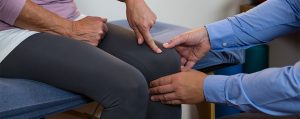Hip 101: Understanding Your Pain and Options for Relief
Within the healthcare system, it can feel like there’s a lot of jargon out there, making it difficult to make sense of your symptoms and the available treatment options. Understanding what is going on when you are in pain is comforting and allows for a better understanding of treatment plans. The hip, specifically, is a very complicated joint with many abbreviations and terms that require further explanation. Below, you will find definitions and understanding of FAI, IFI, THA, acetabulum, labrum, and dysplasia – all common medical terms pertaining to the hip.
4 Ways Physical Therapy Can Help You Avoid Hip Surgery
Hip pain and treatment recommendations continue to be a highly researched and studied topic. As we learn more, we learn hip surgery is very common. As noted in the research, there were more than 62,000 hip surgeries performed between 2008 and 2013. With the increasing prevalence, one would think surgery is the only answer, but can physical therapy help you to avoid having hip surgery altogether? The answer could be yes! The goal of physical therapy is to reduce pain, improve strength and improve function to be able to perform all prior activities of daily living. Physical therapy can provide relief in the hip to avoid surgery in some cases. Here are four areas that physical therapy can address to help avoid surgery.
4 Moves For Sciatica That Hit The Spot
There’s a good chance that you or someone you know has experienced “sciatica” issues. According to the Cleveland Clinic, about 40% of the population in the U.S. will experience sciatica symptoms at some point in their life. The sciatic nerve is made up of multiple nerve roots that travel from the back into the lower leg. You have one sciatic nerve on each side of your body, making it common for people to have symptoms on one side and not the other. Since the nerve travels from the back and down into your leg, there can be multiple areas in which the nerve can be affected, causing similar symptoms. For this reason, it is important to identify the root of the problem causing the source of pain. Click here to learn more about the sciatic nerve and symptoms of sciatica.
Can Physical Therapy Help You Avoid Hip Surgery?
Hip pain and treatment recommendations continue to be a highly researched topic. While hip surgery can be a successful option to manage hip pain, can physical therapy help you avoid hip surgery in the long run? The answer is yes! Physical therapy can help provide relief in the hip, and in turn, avoid or prolong potential surgery. Physical therapy aims to reduce pain, improve strength, improve mobility, and improve function to perform all prior activities of daily living. Here are four ways physical therapy can help to avoid surgery.
You’ve Had A Hip Replacement, Now What?
It is estimated that physicians perform 350,000 hip replacement surgeries in the US every year. There are two main types of replacements that are performed: Anterior hip replacement & Posterior hip replacements. Both of these surgeries have the same results, but the recovery process differs for each.
3 Unexpected Reasons to Exercise Your Hips
Have you ever wondered about the connection between knee pain, back pain, and urinary leakage? The common denominator is your hips! The hip serves as a ball and socket joint, linking the pelvis with the femur’s head (thigh bone). Its primary role is to provide dynamic stability during weight-bearing activities like walking and jogging. Approximately twenty-five muscles attach to the hip. They can be divided up by their primary action: flexors, extensors, abductors, adductors, external rotators and internal rotators.
Should I Exercise If My Joints Make Noise?
Do your joints make noises when you move? Many people hear noises such as pops, creaks, or grinding in their joints, often in the knees, with activities such as going up stairs or squatting down. But it’s important to know that these noises can be normal, especially if they are not associated with any kind of pain! When joints make noise, it is commonly known as crepitus. Let’s take a closer look at what crepitus is and what you need to know in order to continue safe exercise.
An All-Ages Hip Workout Anyone Can Do
It’s all in the hips! Have your hips been feeling weak lately? Or maybe someone has told you to strengthen your hips, but you’re not sure how? Look no further – here are five hip exercises anyone can do, regardless of age or activity level.
